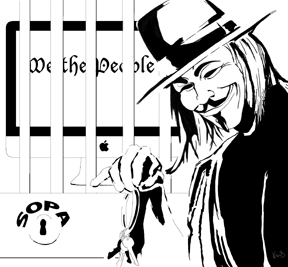By now, almost everyone has heard about the Stop Online Piracy Act and the Protect Intellectual Property Act. These bills would have forever changed the Internet as we know it, threatening to shut down or censor any website that might unintentionally link to copyrighted material.
These bills caused widespread opposition and online protests with claims they would violate First Amendment rights. As a result, voting on the bills was canceled after an overwhelming negative response from the public. Although it appears these bills have been defeated, future bills like the Anti-Counterfeiting Trade Agreement could still threaten the free flow of information.
Why is Congress focusing so much time and money on preventing piracy when more serious problems must be addressed? We still need a plan to fix the economy and end unemployment, homelessness and hunger. Since when did the federal government put the profits of corporations ahead of people’s fundamental rights?
Why are Hollywood and the record industries complaining? People are still buying music, movies and TV shows from legitimate download sites like Apple’s iTunes store, which had about $6 billion in sales in 2011, up 55 percent from 2010.
Movie theaters are still breaking sales records with sold-out shows and Blu-ray sales were up 35 percent from the year before, according to blu-raydisc.com.
It’s difficult to determine just how much revenue has been lost because of online piracy, but actors, singers and record executives still seem to be doing well with lavish mansions, fancy cars and yachts.
Copyright infringement and piracy are obviously problems that need solutions, but these bills are not reasonable ways of doing so. We need to find new ways of preventing online piracy other than censoring the Internet.
Maybe the record and movie industries need to come up with new ways of encoding copyrighted material and go after software companies that make the ripping and decoding of CDs, DVDs and Blu-rays possible.
In the digital age, it’s difficult for legislation to keep up with changing technology. The Hollywood and recording industries should fight technology with technology to reduce or eliminate online piracy and not expect the government to do all the work by inconveniencing the rest of us.
We, as students, should be more vocal against bills like these that infringe on our rights. We need to be in contact with our representatives to let them know how we feel about these issues. The movie and recording industries don’t speak for us.
To find and write to your member of Congress, go to http://www.contactingthecongress.org/.
























